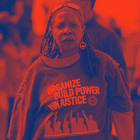
Trump Disrupts the Valley
Why the titans of Silicon Valley—long tied to the Democrats—have been warming up to Trumpism.


Why the titans of Silicon Valley—long tied to the Democrats—have been warming up to Trumpism.

Remembering Freddie Gray, 1989–2015.

A hundred years ago, political earthquakes shook the globe; their tremors rattle us still.
Introducing the special section of our Fall issue.

To transform society, radicals need to appeal to millions of people, many of whom may never join their ranks.

To access Dissent’s full Summer issue, please click here.

“He was late for all the same reasons he was late each day, he was running for all the same reasons he ran each day. . .”
A short story.

We don’t need to de-politicize Nietzsche to save him from fascist appropriation.

To access Dissent’s full Spring issue, please click here.

The EU provides a convenient villain for those eager to blame the rise of neoliberalism on unelected bureaucrats acting at the behest of capital. But if historians are correct, this account is a fable that distracts from a grimmer reality.

Trump’s child care plan is another tax giveaway to the wealthy. But the Democrats can offer a better alternative.

In their new documentary series The Vietnam War, Ken Burns and Lynn Novick offer a sharp indictment of an atrocious war. But when it comes to portraying the antiwar movement, they lapse into troubling stereotypes.

Samuel Abrams’s Education and the Commercial Mindset provides the most detailed analysis of school privatization to date, yet overlooks the critical role that anti–union animus plays in fueling it.

The Germany of 2015 will be remembered for allowing close to 1 million asylum seekers into the country. But public opinion in the country has since shifted to the right.

Hidden from the public and overlooked by regulators, immigrant workers in the laundry industry face a litany of hazards and abuse. Our six-month investigation reveals the extent of their exploitation.

I Am Not Your Negro shows how James Baldwin became disillusioned about the possibility of any peaceful resolution to racism, but underplays the force of his internationalist and anti-capitalist perspective.